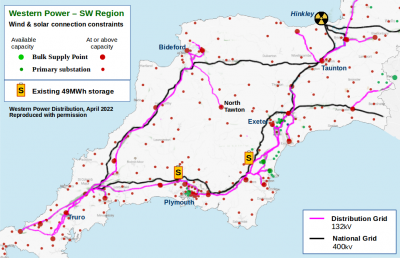No spare parts for Vaillant Ground Source Heat Pumps in the UK & major corrosion issue is another problem for GSHP
That's a very good price for a 3-phase meter from a UK supplier, @robl 😀
Before you buy it @phowardstutterheim I'm just having a quick think about whether you might ever need to retrieve the data from that meter electronically.
Data can be read from meters (and other similar devices) using a software protocol called Modbus. This usually connects to the meter via an RS485 port.
Don't worry about the technical names.
It's not too dissimilar than trying to identify the required USB plug for your phone or laptop!
The meter you're considering (above) at £99 does not have an RS485 connection.
You can only obtain the usage by reading the display.
There are 3-phase power meters available with Modbus/RS485, but in the UK they cost a lot more.
I usually buy such devices direct from China, where they're made.
Here's one at £50 +VAT from Arlen & Alice Trading... a supplier already known to me.
As you can see in the description, the cost is lower, but there's a delay whilst they send it... usually around 15-days.
Why might you need to read the meter electronically?
If you decide to install storage batteries, then you will have controller devices for these which will use Modbus (or sometimes CAN bus).
Knowing the energy required to run your GSHP for the following day allows a controller to check if you expect to generate (and store) enough solar-power to run it.
If not, then the forecast deficit can be imported from the mains-grid when it is cheapest/greenest.
It's not hugely important because you'll have other appliances also wanting electricity the next day, not just your heat-pump.
So my advice is this:
If the most likely location for your storage batteries is in the same room/building at the mains trips/fuses for the GSHP, then it's better to install a 3-phase energy meter which offers Modbus.
But if these are two separate buildings, then you might as well go ahead with the £99 meter which Rob recommended, and get it fitted asap.
My advice is based on the faff of you running a cable between those buildings in order to make the Modbus connection.
Please don't be daunted by any of the above.
There are lots of us here who are 'on your case' and can help to clarify issues as they arise.
You will receive further assistance if you've never previously bought items direct from China.
Save energy... recycle electrons!
@transparent Many thanks for this info - we will certainly be doing some work on our system and this will be part of that, thanks to these discussions.
We are very fortunate to have a Ukrainian living with us who was the Kharkiv regional IT manager for Ukrenergo - the Ukrainian state energy company responsible for the country's high-voltage transmission lines and much of the country's regional energy supplies. He is an incredible source of knowledge (among others, he's a network magician), and very practically skilled as well - but we haven't yet broached this subject with him.
Can you imagine that he's been in the UK for 9 months, looking for a job for 6, and hasn't made any inroads whatsoever in the energy sector or elsewhere? You should see his CV. He has been told that, in order to get a job in the UK, he needs to have had a job in the UK...
Well this is a very fortuitous happenstance @phowardstutterheim I've been keeping a look out for just such a Ukrainian here in the Westcountry!
My view depends on whether he intends staying in the UK indefinitely, or whether he's prepared to return to Ukraine and help rebuild the country after the war.
The latter is preferable in my mind.
I have practical experience in Rwanda following the 1994 genocide. Few men remained, whether they were Hutu, Tutsi or Pygmy.
Many had fled across the borders for safety, not to return for years.
Amongst those who were still in Rwanda, many were disabled physically and mentally, leaving them unable to assist with rebuilding.
Almost everything had to be done by training up women, who outnumbered men 8:1
A similar situation will unfold in Ukraine, but in this case their energy grid has been deliberately destroyed.
Many of the men with the skills necessary to reconstruct a resilient electricity grid will have been killed or injured.
It is usual in these circumstances for engineers from our regional DNOs to be temporarily assigned to the devastated country to assist in (re-)training and building a functional grid.
That happened after the earthquake destroyed Haiti in 2010, for example.
However, my view is that Ukraine shouldn't reconstruct the electricity grid as it used to be.
The topology, like ours here in the UK, was based on having relatively few large power-stations connected to a main transmission grid (400kV).
We now have to shift towards a new architecture in which thousands of renewable-energy generators feed electricity into the Distribution Grid at much lower voltages.
That's the pattern which Ukraine needs to adopt after the war.
However, I think they should also do so in a way which greatly increases the resilience of the electricity supply.
For technical reasons, an electricity grid must operate as one network, linked together by it having a common AC frequency (50Hz in Europe).
If a major fault occurs at the Grid-Supply Point at Taunton, Somerset, then you can't keep Devon and Cornwall operating as a separate grid.
Just because the Westcountry has oodles of renewable generation, doesn't allow it to be operated independently.
However, any location which has hybrid off-grid storage (such as I do) can continue to run as normal.
If my area has a grid power-outage, my in-house inverters still supply 240v AC for the lights, gas-boiler, UFH pump, well-pump, internet & phone connections etc.
That's what Ukrenergo should aim for.
Unlike our British DNOs, they probably are permitted to own and manage storage assets.
So they could supply grid power to a village/ school/ hospital in such a way that the critical equipment is actually powered via storage batteries rather than directly from the grid.
That's the strategy I'm recommending for your house/farm.
Depending on the size of the storage which you choose to install, you should be able to operate the GSHP and most of the house for many hours during an outage.
The crunch point for you to discuss with your Ukrainian friend is whether he would be prepared to work as a field engineer for UK Power Networks, whilst simultaneously assisting your husband with assembling an off-grid battery system.
For the moment, please ignore the fact that he's an IT professional, not a grid engineer, and that UKPN haven't offered him a job.
I have suggestions to make which can help overcome such issues!
Save energy... recycle electrons!
@transparent I'm sending all this info onto him and, hopefully, he will respond himself!
I'm really impressed by the work you've done, and by the DNOs stepping in after crisis/disasters. I spent 20 years working in the UN system myself, mainly in Latin America (I lived in Central America for 10 years during the wars), and know how critical the work that you're describing is. My Ukrainian friend worked for the 1st six months remotely to support as he could - in some cases, helping to reconstruct bombed power stations based in part on photos that he had in his possession, as well as his knowledge of the IT infrastructure, among other things...
He's not a field engineer, however - he's an IT man through and through. So, if you have any suggestions for him on job-seeking I'm sure he'd be very pleased to hear them. He applied to NATO and has also applied to the NHS, and other private sector firms - he's gotten a few interviews but not in the power sector.
He has three kids in the UK and a family to support back in Ukraine. I cannot say anything about his willingness and ability to return with his family anytime soon...this is very personal.
I too am from an IT background @phowardstutterheim
Let's note that the inverters, controllers and meters used for managing renewable generation and storage are all using embedded processors.
The code is written on a PC and then squirted across to the processors within relevant devices.
It then runs independently when the power is connected.
Your Ukrainian colleague may well have come across embedded processor development platforms such as Raspberry-Pi, ESP32 or Arduino.
These micro-controller modules are cheap and often used by hobbyists working in the fields of model-railways, radio-control airplanes and smart-home technology.
Development of the future energy supply grid requires cross-over engineers who understand the wider picture and where their skill-set fits within an engineering team.
In Ukraine it is vital that they create a system which is resilient against cyber attack and physical damage.
They require controllers which are autonomous, unable to be hacked or taken over remotely.
Our own National Smart Meter Network is a good example of this.
Yes, I'm well aware of bugs/deficiencies, but the design is such that the Smart Meters continue to operate and record our energy usage.
Save energy... recycle electrons!
Posted by: @phowardstutterheim@transparent Many thanks for this info - we will certainly be doing some work on our system and this will be part of that, thanks to these discussions.
We are very fortunate to have a Ukrainian living with us who was the Kharkiv regional IT manager for Ukrenergo - the Ukrainian state energy company responsible for the country's high-voltage transmission lines and much of the country's regional energy supplies. He is an incredible source of knowledge (among others, he's a network magician), and very practically skilled as well - but we haven't yet broached this subject with him.
Can you imagine that he's been in the UK for 9 months, looking for a job for 6, and hasn't made any inroads whatsoever in the energy sector or elsewhere? You should see his CV. He has been told that, in order to get a job in the UK, he needs to have had a job in the UK...
That is one of the problems from which businesses in the UK now suffer. I have worked on quite a number of multi billion dollar projects around the World with Engineers of different nationalities, many of which I would not have paid using bent washers, if I was paying the bill. To hear that the skills of a highly trained and competent Engineer are not being utilised I find to be quite appalling.
I have been turned in the past as being 'over qualified', though I often infer from that comment that the 'Manager' fears hiring someone with the knowledge and skills that would make the Manager's skills look mediocre at best.
I would advise him to apply for both permanent and contract work, at numerous online employment websites. One I used extensively in the past is jobs.co.uk, though there are plenty of others.
Posted by: @transparentI too am from an IT background @phowardstutterheim
Let's note that the inverters, controllers and meters used for managing renewable generation and storage are all using embedded processors.
The code is written on a PC and then squirted across to the processors within relevant devices.
It then runs independently when the power is connected.Your Ukrainian colleague may well have come across embedded processor development platforms such as Raspberry-Pi, ESP32 or Arduino.
These micro-controller modules are cheap and often used by hobbyists working in the fields of model-railways, radio-control airplanes and smart-home technology.Development of the future energy supply grid requires cross-over engineers who understand the wider picture and where their skill-set fits within an engineering team.
In Ukraine it is vital that they create a system which is resilient against cyber attack and physical damage.
They require controllers which are autonomous, unable to be hacked or taken over remotely.Our own National Smart Meter Network is a good example of this.
Yes, I'm well aware of bugs/deficiencies, but the design is such that the Smart Meters continue to operate and record our energy usage.
All large, and often small, industrial control systems utilise Distributed Control Systems (DCS) or Programmable Logic Controllers (PLC's), with the system being designed to be autonomous and hence not connected to the outside World. There can be exceptions for data gathering, via suitable firewalls, but the control algorithms would not be accessible.
Modification of the control parameters would be carried out by dedicated PC's, which reside within the firewalls, or by using a laptop computer connected directly to the relevant controller.
Posted by: @derek-mThere can be exceptions for data gathering, via suitable firewalls, but the control algorithms would not be accessible.
@derek-m and I are in agreement on this point.
However Ofgem, the industry regulator, has permitted the UK to deviate from this rule in the case of EV Smart Chargers and electricity storage.
As more of these are installed onto the Distribution Grid, we are leaving the country open to attack due to latent vulnerabilities in our electricity supply.
This is the sort of important detail which our Ukrainian colleagues need to be made aware of.
They cannot afford to allow such a casual approach to be implemented when their grid is rebuilt.
Save energy... recycle electrons!
NEWS - Vaillant replied in writing to my complaint after I sent it to their headquarters in Germany, to the attention of their Chief Executive Officer, and to the head of Vaillant in the UK. They promised that they would ensure the timely supply of GSHP spares in the UK and would implement an emergency procedure in case that vulnerable consumers find themselves without heat in cold weather. If anyone has any problems from here on out with Vaillant Ground Source Heat Pump spare parts please get in contact with me.
We have now discovered possible corrosion on the refrigerant side, as well as on the hot water side, of our Ground Source Heat Pump. Several temperature sensors have been damaged - these sensors are subject to corrosion. What we do not know is the following:
a) What else could be damaged by corrosion on the refrigerant side and how can we detect this damage if the system has not broken down completely? Could the buffer vessel also be affected and, if so, how would we know?
b) We have been told that the condenser might be full of corrosion on the hot water side. We have also been told it cannot be flushed. How can we learn about the condition of the condenser if the system is still working?
c) Our COP is quite low - can the above be a reason for this?
- 26 Forums
- 2,378 Topics
- 53.9 K Posts
- 271 Online
- 6,060 Members
Join Us!
Worth Watching
Latest Posts
-
RE: Radiator sizing sanity check
@jamespa Thanks, yes. it’s even more difficult as on...
By Papahuhu , 3 minutes ago
-
A sneak preview of the onboard compensation curve desig...
By F1p , 9 minutes ago
-

RE: Solar Power Output – Let’s Compare Generation Figures
@papahuhu They came to ‘axe you’ what you were up to?
By Toodles , 27 minutes ago
-
RE: Cascade 2x Grant Areona 10kw ASHP - Ongoing setup issues
Either complete Bow Locks or at best a marginal effect....
By JamesPa , 1 hour ago
-

RE: Testing new controls/monitoring for Midea Clone ASHP
I had a look and it looks complicated to me! There may ...
By cathodeRay , 1 hour ago
-
Hi all I’m looking to get some insight on what others...
By Renewables345 , 1 hour ago
-

RE: The Great British Heat Pump Owner Persona Survey: Let's Build Our Archetype!
@mosibi, go on then, complete the survey. Let's get the...
By Mars , 2 hours ago
-
RE: Water Hammer After Heat Pump Install
@jaynieq I wish you luck with this one. I think the ma...
By JamesPa , 4 hours ago
-
RE: Grant ASHP 17.5 kw. weather curve
All sounds good and like you know what you are doing. R...
By JamesPa , 4 hours ago
-
RE: Optimum new build house design for Heat Pump
From first principles I would say: Definitel...
By JamesPa , 19 hours ago
-

RE: Weather compensation- why you should use it
As good a place as any to drop this video:/p>
By Mars , 22 hours ago
-
RE: Forum updates, announcements & issues
@transparent D'Oh - I did look before I posted but I mi...
By dr_dongle , 24 hours ago
-
Compatibility with Samsung AE080RXYDEH
I am new to all this. We have a SamsungAE080RXYDEH that...
By John999 , 24 hours ago
-
RE: New Fogstar 15.5kWh upright solution
@batpred Maybe you should buy your additional batter...
By Bash , 1 day ago
-

RE: Data Accuracy Problem: Daikin 8kW Heat Pump's Onecta App vs MMI Power Consumption
@nursethescreens Yes, comfort and happiness of the fami...
By Toodles , 1 day ago
-
RE: Connecting Growatt SPH5000 over wired ethernet rather than wireless
Thanks folks. I had tried googling an ethernet lab adap...
By z8lccda , 2 days ago
-
RE: Changing from 4-port buffer to volumizer
@toodles I'm not concerned that the behaviour is not no...
By Andy1618 , 2 days ago
-

-

RE: Setback savings - fact or fiction?
I agree, and I think there are two things in play here....
By cathodeRay , 2 days ago
-
RE: Help needed with Grant Aerona 3 issues
First time posting so bear with me. Some bits that have...
By Adamp , 3 days ago







